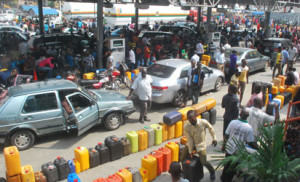 The industrial action embarked upon on Tuesday by oil workers across the country due to the restructuring of the Nigerian National Petroleum Corporation has been suspended.
The industrial action embarked upon on Tuesday by oil workers across the country due to the restructuring of the Nigerian National Petroleum Corporation has been suspended.
As a result, work resumed at both the Abuja headquarters of the corporation and all its subsidiaries, as well as at petrol stations operated by the national oil firm.
It was learnt that the strike was suspended on Thursday morning after a marathon meeting between officials of the Federal Government and the National Union of Petroleum and Natural Gas Workers and the Petroleum and Natural Gas Senior Staff Association of Nigeria on Wednesday night.
However, the suspension of the strike did nothing to relieve motorists in different parts of the country of the pains they have been experiencing in the past two weeks due to shortage of petrol.
In Lagos, very few filling stations which had the product to dispense recorded long queues of desperate motorists, who were joined by those who wanted to use the product to fuel their generators as a result of the prolonged blackout being experienced in the state and the attendant heatwaves.
The situation was the same in Abuja, Kaduna, Ogun and Nasarawa.
The workers had staged a protest at the headquarters of the NNPC, blocked the entrances to the firm and shut its operations nationwide on Wednesday, a development that worsened the already bad state of fuel supply across the country.
On Thursday morning, the Group Chairman, NUPENG, NNPC Branch, Mr. Odudu Udofia, told one of our correspondents that the strike had been suspended.
The suspension of the strike was also confirmed by an official of the NNPC in an email, in which he said officials of “NUPENG and PENGASSAN had a marathon meeting with the GMD/Minister of Petroleum (State) and NNPC top management for several hours, ending this (Thursday) morning at 4:30am on the ongoing industrial action.
“After exhaustive deliberations, a resolution was signed by the two parties. In view of that, the industrial action is hereby suspended.”
It was also gathered that marketers of petroleum products were currently avoiding the Lagos market, which they said was heavily regulated in terms of product pricing, adding that this was making them to have low margins.
One of our correspondents gathered that this was the reason why the current petrol scarcity was more pronounced in Lagos and its environs.
With the product selling in most states of the federation above N100 per litre instead of the regulated prices of N86 and N86.50, two marketers who spoke to one of our correspondents on condition of anonymity, said it made more market sense to concentrate on markets outside Lagos, where prices were arbitrarily fixed.
“As it is right now, supplying product to Lagos is not as good as supplying to other states. For independent marketers especially, there is a strong urge to sell their products in other markets for better yields,” one of the marketers said.
Reacting to the development, the Chairman, NUPENG, Lagos Zone, Alhaji Tokunbo Korodo, said the workers unions had called off the strike they embarked on and loading of products had commenced at the depots.
He also confirmed that more marketers were interested in supplying to markets outside Lagos owing to the fact that the strict regulation of the business in the state did not give room for higher prices above the N86.50 official price per litre.
“Marketers come here, pick products and move to areas outside Lagos. They sell at prices above the N86.50 official price and make more money,” he explained.







